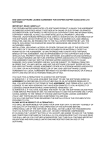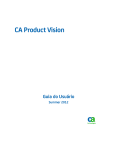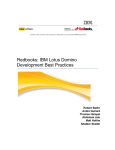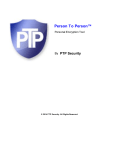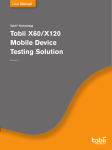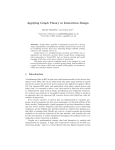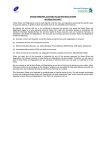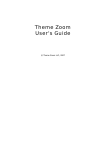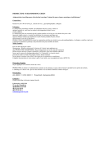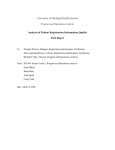Download NotesTracker User Guide
Transcript
NotesTracker User Guide The comprehensive toolkit for tracking usage and compliance and enhancing the functionality of your IBM Notes and Domino Applications Version 6.01 Last updated on 1st June 2015 © AGECOM http://www.agecom.com.au NotesTracker Support: [email protected] NotesTracker User GuideNotesTracker – IBM Notes and Domino Application Usage Tracker – Version 5.3 TABLE OF CONTENTS About this Guide ................................................................................................................................................................. 3 Disclaimer ....................................................................................................................................................................... 3 What is NotesTracker? ....................................................................................................................................................... 4 Example Uses of NotesTracker ...................................................................................................................................... 5 The Packaging of NotesTracker – Evaluation and Licensed Versions ............................................................................... 6 About NotesTracker ............................................................................................................................................................ 8 Derivation of the Name “NotesTracker”........................................................................................................................... 8 NotesTracker Trademark, and Fair Use .......................................................................................................................... 8 NotesTracker Usage Terms and Conditions ................................................................................................................... 8 Software Usage Terms and Conditions ........................................................................................................................... 8 Copyright and Licence .................................................................................................................................................... 8 Limited Warranty ........................................................................................................................................................... 10 How you View and Analyze Usage Metrics generated by NotesTracker .......................................................................... 11 Displaying the Usage Log Document ............................................................................................................................... 12 NotesTracker Usage "Reports" ......................................................................................................................................... 14 Context-Sensitive Help Available...................................................................................................................................... 15 Extended Usage Analysis and Reporting .......................................................................................................................... 17 Tailoring of Views, and Interfacing with External Analysis Tools ................................................................................... 17 TIP- Opening NotesTracker Usage Views in a New Window........................................................................................ 17 Overcoming the Reporting Limitations of Lotus Notes Views ....................................................................................... 18 NotesTracker Using Log Charting using Notes Reconn Freeware from OpenNTF.org ................................................ 19 Page 2 of 24 NotesTracker User GuideNotesTracker – IBM Notes and Domino Application Usage Tracker – Version 5.3 ABOUT THIS GUIDE This guide is for Users of Lotus Notes / Domino applications in which NotesTracker has been implemented. It provides detailed information on viewing NotesTracker logs, analyzing data, and creating reports. The first step to implementing NotesTracker is for your Lotus Notes / Domino developers to add the necessary NotesTracker design elements to your applications. The steps to perform this are covered in the NotesTracker Developer Guide. After the required design elements have been added to your applications the NotesTracker repository database(s) need to be created, configuration settings, and alerting need to be setup. This information is covered in the NotesTracker Administrator Guide. The rest of this guide assumes NotesTracker has already been implemented & configured and shows you how to use and get the most out of your NotesTracker enabled applications. DISCLAIMER This guide could include technical inaccuracies or typographical errors. Please advise us if you see the need for any corrections. We welcome your feedback about any technical inaccuracies plus your comments about this guide’s clarity, usability and missing or incomplete information. Changes are periodically made to the information herein. These changes will be incorporated in new editions of the publication. For all but trivial changes (such as minor errors in spelling, punctuation and layout) the modified publishing date will be displayed on the front cover. AGECOM may make improvements and/or changes in the software and its features described in this guide at any time without notice. You should periodically check our website and weblogs for notification of such changes. Page 3 of 24 NotesTracker User GuideNotesTracker – IBM Notes and Domino Application Usage Tracker – Version 5.3 WHAT IS NOTESTRACKER? NotesTracker is a comprehensive application enabling developer toolkit. The application makes it easy and simple for you to extend your IBM Lotus Notes and Domino database applications so that you can rapidly detect and report on a wide range of actions being carried out on the content of the databases. NotesTracker was originally developed by Asia/Pacific Computer Services and is now proudly provided and supported by AGE Computer Consultancy (herein referred to as AGECOM) (http://www.agecom.com.au). NotesTracker monitors the creation, reading, updating, and deletion of documents in Lotus Notes databases. Furthermore you can track not only that a particular Notes document in its entirety was updated (when, where, and by whom) but what parts of a document's content was altered. This is done by selecting the logging of the “before” and “after” values stored in all fields or just user-nominated fields in the document. You can also track changes to attachments stored in documents, by logging the “before” and “after” names and sizes of attachments. The attachments themselves are not logged, since this could enormously increase the Repository database's disk space requirements, with attachments typically being megabytes in size. NotesTracker has been designed and coded carefully to run as efficiently as possible in order not to add a significant performance burden to your Notes/Domino environment. NotesTracker can log other content manipulation actions too, such as the pasting of documents into a database or the mailing-in of messages arriving from the Internet. NotesTracker goes beyond just the passive logging of actions occurring against database contents. In terms of being proactive, NotesTracker empowers your developers to extend your applications by tracking additional types of actions (such as button presses), to generate mail alerts when document content is acted upon in ways that are important to you, and a way for you to build dynamic Notes views for continuous monitoring of content- related events in the RSS fashion that is so popular on the Internet. Page 4 of 24 NotesTracker User GuideNotesTracker – IBM Notes and Domino Application Usage Tracker – Version 5.3 EXAMPLE USES OF NOTESTRACKER Here's a small selection of the ways that you might benefit from using NotesTracker. ✔ Generate comprehensive document history trails (sometimes referred to as "breadcrumbs") – See who Creates, Reads, Updates, and Deletes individual Notes documents, as well as document pastes and mailins. This is great for troubleshooting, and for finding “the guilty ones” who entered bad data or deleted key documents! ✔ Analyze all the active users of your Notes databases, arranged to show the significant users (that is, "the makers" -- those who contribute most to your applications by adding/updating content – versus "the takers" who consume content but don't develop and maintain it. This can be used to reward your key knowledge contributors, or to nudge less active users. ✔ Field audit trails – Determine who made what changes to individual field values in each document. This could generate a payback by enabling you to gain understanding and content control for as little as a single critical database of yours. (Indeed, one user justified purchase of a NotesTracker license by gaining control over just their Domino Directory database.) ✔ Discover what sort of document content is most popular, or "hottest" (you will see the percentage usage of each document in a database). Use this to determine if an application is being used as you intended, whether it needs design improvement or enhancement, and so on. ✔ Determine which documents have low usage rates, and thus are good candidates to be archived or purged. ✔ Mail Tracking – NotesTracker can be applied to any sort of database, but one popular application is the tracking of activities occurring in users' Notes Mail databases – typically for compliance, data secrecy or privacy reasons (e.g. when a user's mail is delegated to any other person). Read about the importance of doing this in US Government Agencies Face Challenges in Managing E-Mail (GAO report, April 2008) ✔ When and where did it happen? Examine the date, time and server for each "hit" if needed, once a database's design has been enhanced by adding NotesTracker code. Identify usage patterns and trends – over a period of hours, days, weeks, months or years, and in easily-understood categorized Notes views – equally valid for Web- based Domino applications or Notes Client accesses. ✔ Determine detailed user navigation patterns – How and when each user shifts from document to document, and database to database. Are they using your Notes applications as designed or expected? Does documentation need to be improved or additional application training need to be carried out? ✔ Application performance effects? Are specific document actions (such as updates) contributing most to Domino server loading? This could give you pointers, otherwise unobtainable, about how you might redesign or reconfigure your Notes applications to lessen server load and improve responsiveness. ✔ Breaking News – design a Notes view filtered view to display the very newest documents in the order they are created or updated. This is just like generating your very own RSS-style newsfeeds. ✔ Track "special" documents – certain documents in a database that you designate as being particularly interesting and/or important for some reason. These could be any documents. For example, in a Domino Directory database there will probably be Server Documents for a select few of your servers, such as mail hubs, that you want to focus on and be automatically alerted if key fields relating to network performance or security are altered. ✔ Activity Alerts – get notified via e-mail as soon as documents are updated, deleted, and so on (even when certain fields that you select are updated), or as soon as a document that you nominate as "special" is used. It could be just about anything, such as a sale being won or lost, a credit limit being exceeded, a document is deleted, a special menu or seating request in a travel request application. ✔ Track "generic" events – this is a NotesTracker term referring to events like button clicks and otherwise untrackable application actions that are of interest. With minimal database design change, you can track a range of application-related actions that might otherwise require lots of coding and testing. ✔ Why track everybody? If you so need or desire, you can track only specific users of a particular database (or ignore them and track everybody else). For example, you may wish to focus your tracking on the actions of certain key users of a database, or perhaps even just a single user suspected of defalcation or data theft or privacy violations, or only those people encountering problems in using an application, or whatever the case might be. Page 5 of 24 NotesTracker User GuideNotesTracker – IBM Notes and Domino Application Usage Tracker – Version 5.3 THE PACKAGING OF NOTESTRACKER – EVALUATION AND LICENSED VERSIONS NotesTracker comes in the form of a Repository database – referred to as the “NotesTracker Repository” or the “NotesTracker log” – which delivers several capabilities: It can be used to hold an audit trail, or log, of the application activity for your Notes databases. A collection of usage log entries builds up over time as the databases' documents are being created, accessed and deleted and when other trackable events occur (such as database or view opens, document pastes and mail-ins, plus others that you can define). The NotesTracker Repository database provides, via Notes views, a continuously-updated analysis of document and view usage patterns in your own application databases. You may have one or more NotesTracker repositories located throughout your Notes/Domino network, and they will behave and replicate just like any other ordinary Notes database. This is important, because it means that no special repository or reporting infrastructure needs to be learned about, installed and maintained – that is, with NotesTracker it’s a simple case of “business as usual.” This guide explains how you would decide about and set up a single repository or multiple NotesTracker repositories, each repository used for logging the activities occurring in just a single database (if it’s an important one) or in groups of related databases. The NotesTracker Developer Guide discusses the advantages (and disadvantages) of a further option: modifying the design of a given database so that NotesTracker’s usage logging entries are stored within the database itself, rather than getting sent to a central NotesTracker repository. The distributed NotesTracker repository database also doubles up as the code container for the NotesTracker Software Development Kit (SDK), that is, as the NotesTracker design repository. As a licensed user (purchaser) of NotesTracker you will get a version of the NotesTracker Installer that provides access to all NotesTracker source code (LotusScript and Formula Language) and all other design elements (forms, views, agents, etc). This enables your Notes developers and administrators to easily adapt your Notes databases for comprehensive usage tracking, by building the NotesTracker code into the database designs. If you are using the free evaluation version, all of the functions work without limitations and can be fully exercised, but you do not get access to the underlying NotesTracker source code and design elements. In Lotus Notes terminology, the evaluation databases have “hidden” designs. Also distributed with the Repository are several representative Lotus Notes databases to give you as a potential user some representative NotesTracker-ready applications for familiarization and experimentation with NotesTracker configuration, usage and reporting: Page 6 of 24 NotesTracker User GuideNotesTracker – IBM Notes and Domino Application Usage Tracker – Version 5.3 The example databases in the NotesTracker evaluation version are fully functional (but their designs are hidden). Our expectation is that after a little experience using them you will quickly come to see the potential for NotesTracker in your organization and be able to make informed purchase decisions. The example databases in the NotesTracker purchased (licensed) version do not have their designs hidden. As a licensed user, your Notes/Domino developers should examine the various NotesTracker techniques in these databases as a kick-off point to quickly discover how NotesTracker can be put to use. This guide together with tips on the NotesTracker News Blog will quickly show your Notes developers and administrators how to adapt your own Lotus Notes applications and take full advantage of NotesTracker’s capabilities. Page 7 of 24 NotesTracker User GuideNotesTracker – IBM Notes and Domino Application Usage Tracker – Version 5.3 ABOUT NOTESTRACKER DERIVATION OF THE NAME “NOTESTRACKER” Items such as documents and views in Lotus Notes databases are sometimes referred to as “design notes” or just “notes”, hence the name “NotesTracker” because it is the user actions being performed against these items that are being tracked. NotesTracker’s emphasis is on application content and activity against it (rather than on what some other tools track, such as Domino server performance and disk usage, or networking traffic loads). NOTESTRACKER TRADEMARK, AND FAIR USE The term “NotesTracker” is a trademark of AGECOM. NotesTracker is a proprietary product of AGECOM. The information in this guide is Copyright of AGECOM but the information is not hidden. The guide resides in the public domain (as a Web download) so “fair use” of the information is allowed. NOTESTRACKER USAGE TERMS AND CONDITIONS Our aim: to provide you with a reliable, resilient, capable and low-risk solution backed by professional support, while retaining our precious intellectual property rights invested in NotesTracker and receiving an adequate return in order to be here to support you in the long run! As a convenience, on the following pages is a snapshot of the NotesTracker terms and conditions of use that applied at the time that this guide was last updated. Please note that the terms are varied from time to time and you should always obtain latest version of the terms and conditions from the AGECOM website (since it is these which apply to your use of NotesTracker): http://www.agecom.com.au/NotesTracker SOFTWARE USAGE TERMS AND CONDITIONS AGECOM reserves the right to make modifications to these terms and conditions from time to time. The latest terms and conditions are available on the AGECOM web site for viewing prior to the downloading and installation of the Software and will take precedence over any other form of the terms and conditions. Such modifications shall be effective immediately upon posting of the modified agreement at this Web site. You agree to review the agreement periodically to be aware of such modifications and your continued use and/or downloading of software available to you hereunder shall indicate your acceptance of the modified agreement. COPYRIGHT AND LICENCE The "NotesTracker" Software (also referred to as "AsiaPac Document Usage Tracker" and / or “AGECOM Document Usage Tracker” Software) is owned by AGECOM and is copyrighted and licensed not sold. The term "Software" means the original program and all whole or partial copies of it. A Program consists of machine- readable instructions, its components, data, audio-visual content (such as images, text, recordings, or pictures), and related licensed materials. The entity that purchases the license ("you") and all its officers, employees, contractors and other associated persons will be subject to this license agreement. Page 8 of 24 NotesTracker User GuideNotesTracker – IBM Notes and Domino Application Usage Tracker – Version 5.3 The evaluation form of the Software is provided with hidden design and you shall not modify, translate, disassemble, decompile, or reverse engineer the Software. The licensed form of the Software is provided with unhidden design so that its design elements may be incorporated into the designs of your Notes databases either without modification or modified and adapted by you to meet your specific usage metrics requirements. For both forms you may not remove, alter or deface any proprietary notices on the Software. You acknowledge that AGECOM owns all right, title and interest in and to the Software or portions thereof, including without limitation all Intellectual Property Rights. "Intellectual Property Rights" means any and all rights existing from time to time under patent law, copyright law, trade secret law, trademark law, unfair competition law, and any and all other proprietary rights, and any and all applications, renewals, extensions and restorations thereof, now or hereafter in force and effect worldwide. The Software and documentation are proprietary to AGECOM. By installing and using the Software, you agree to comply with these terms and acknowledge that the Software and documentation contain valuable trade secrets and other proprietary information belonging to AGECOM that is confidential between you and AGECOM. You also agree to not remove, obscure, or alter AGECOM's copyright notice, trademarks, or other proprietary rights notices affixed to or contained within the Software. You may copy the Software only for purposes of backup including multiple archive backup copies or incorporation into the design of your Lotus Notes databases provided that each and every copy must contain all of the original Software's proprietary notices. You may not distribute (for free or for sale) or sublicense the Software. You agree to hold the Software in confidence and undertake not to pass copies of it whole or in part to another party outside your organization. If you distribute, rent or sell Lotus Notes applications to other organizations you will not include the Software or any derivative or adaptation of it in these Notes databases until such time that the receiving organizations have purchased the appropriate NotesTracker license from AGECOM. You will ensure that anyone who uses your copy of the Software does so only for your authorized use and in compliance with the terms of the license. Unlicensed evaluation software may not be used for production purposes. You are responsible for communicating the terms of this agreement to your employees and contractors and for ensuring their compliance with the terms of this agreement and any company policies and procedures you might have surrounding use of the Software. You must report to us, as soon as possible after you notice it, any suspected misuse arising from your possession of the Software including counterfeiting, piracy, disclosure to non-licensees or other copyright infringement in the Software. AGECOM grants you a non-exclusive license to use the Software when you lawfully acquire it. When you purchase the Software a License Document will be sent to you by AGECOM as a Proof of Entitlement and this will contain a License Number applicable to the Version of the Software as of the date of purchase, being the date that payment funds are received by us. You may use the Software for evaluation purposes but not in production until the license has been issued. The license will apply to the latest Version of the Software at the time of purchase and to any subreleases of that Version but not to any subsequent Version if an Upgrade Price applies to the later Version. Your license is void without registration of required information or registration with incorrect information. The Software is priced on a tiered basis according to the number of Lotus Domino servers or standalone Lotus Notes Client workstations upon which the Software is installed in one or more Lotus Notes databases. You may use the Software up to the level of use purchased. If you purchase the Software at one tier level and later increase the number of installations to a higher tier level then you agree to immediately notify us and forward to us the incremental purchase price between the tier levels. AGECOM cannot and does not give credits or refunds for charges already due or paid. Prior to purchasing the Software you are expected to make every effort to establish that the Software meets your requirements. AGECOM will provide you with information and guidance to aid your efforts but the final decision is yours. The Software is licensed as stated above. The license does not constitute ownership of the Software, only the right to use it. Licenses are not transferable. Page 9 of 24 NotesTracker User GuideNotesTracker – IBM Notes and Domino Application Usage Tracker – Version 5.3 If you do not agree to or cannot comply with any of the terms and conditions, do not attempt to access or use the Software. By installing the Software you agree to these terms and conditions. If you decide not to purchase the Software or on expiry of a lease to the Software you agree to destroy all copies including backup copies in electronic or any other form. AGECOM may terminate your license if you fail to comply with the licensing terms and conditions. You agree that you will not continue to use and will delete the design and code of the Software or any derivative or adaptation of it in any of your Lotus Notes databases or elsewhere as soon as practicable after the license expires. LIMITED WARRANTY This license entitles the user to hold the source code of the Software in escrow and to run the Software, but not to disclose or sell it to other parties either in its entirety or any individual components of its design and code including internal documentation. The cost or guarantee of support is not included in the license except that AGECOM will make reasonable effort to fix any problem in the original Software and there will be no charge for fixing any reported problems. However AGECOM reserves the right to charge for enhancements or new versions and for all repair or maintenance of the Software arising from your modification of the original design or code of the Software. The Software is designed to be applied without change to the design of your organization's Lotus Notes databases but you are free to modify the Software and adapt it as you see fit for incorporation into your databases however any such modifications or adaptations and the effects pursuant to them are not part of free support by AGECOM under the warranty. Subject to any statutory warranties which cannot be excluded, AGECOM shall not be liable for material, equipment, data or time loss, caused directly or indirectly by proper or improper use of the Software or for the effects of any modifications that you make to the Software. In cases of loss, destruction, or corruption of data, AGECOM shall not be liable. AGECOM does not take any other responsibility. AGECOM makes no other warranty. Page 10 of 24 NotesTracker User GuideNotesTracker – IBM Notes and Domino Application Usage Tracker – Version 5.3 HOW YOU VIEW AND ANALYZE USAGE METRICS GENERATED BY NOTESTRACKER As soon as Usage Log documents are written to the NotesTracker Repository database, you can examine them via Notes views provided in the repository. This is a simple yet powerful way to examine and analyze the document (and view) usage patterns and trends in your applications. The various views distributed with NotesTracker were devised to present the database usage in a number of useful and interesting ways. For example, here is what the “By Database / User” view would look like: If the supplied views are not sufficient for your analytic or forensic purposes, it will be an easy task for your Notes developers (or even “power users”) to build additional views or adapt the provided views so as to meet your needs. Alternatively, you could use third-party reporting or charting software to provide more extensive usage analyses. There is a brief discussion of this possibility at the very end of the guide, under the heading “Extended Analysis and Reporting”. Page 11 of 24 NotesTracker User GuideNotesTracker – IBM Notes and Domino Application Usage Tracker – Version 5.3 DISPLAYING THE USAGE LOG DOCUMENT The NotesTracker Usage Log document has the following three sections in it: Generic Information General information for the type of event that has been recorded, when it occurred, the name of the user who performed the action, which document (and a link to the document depending on the type of event), and which database Content-Specific Information Shows the document title, special document content (if applicable), and email alerting information (if email alerting has been enabled). Field Contents – Audit Trail If the log is for changes made to a document this section will show the monitored fields that have been changed, their before and after values, changes made to any attachments, and the logging settings that were in effect at the time the event was logged. Each of the three sections for a typical log document are shown below. Generic Information Page 12 of 24 NotesTracker User GuideNotesTracker – IBM Notes and Domino Application Usage Tracker – Version 5.3 Content-Specific Information Fields Contents – Audit Trail Page 13 of 24 NotesTracker User GuideNotesTracker – IBM Notes and Domino Application Usage Tracker – Version 5.3 NOTESTRACKER USAGE "REPORTS" There are numerous views supplied in the NotesTracker Repository database that present the usage statistics in meaningful ways. They a conventional or “plain vanilla” Notes views, so it will be a simple matter for your Notes developer – or even a "power user" -- to add further views that present information in other meaningful ways (or to remove unwanted views to reduce Domino server overhead). Executive sponsors, content managers, knowledge managers, database administrators, auditors and others will find the NotesTracker log information invaluable for many reasons, such as: To determine the most popular documents (or the least popular ones) To discover the rarely-used documents that are good candidates for being purged To analyze the time-dependency of documents (e.g., whether a "hot" document is accessed soon after it is created) To discover who are the regular users of the databases (and, by implication, the occasional users) To recognize the contributors (document creators and editors) To understand who deleted which documents, and when they did it – sometimes a contentious issue! To understand the pattern of View Opens – because excessive opening of views can cause a severe drain on Domino server resources, usage metrics on view opens can provide an extremely useful insight into which views in which databases are contributing to sever load. Views in databases holding many documents can also consume significant amounts of disk space. The view open metrics provided by NotesTracker offer you a definitive way to determine which views are used infrequently and thus are good candidates for deletion from a database's design. To set up a "Breaking News" view that is suitable for incorporating in a pane on your corporate or departmental Portal Page or Welcome Page (discussed in the NotesTracker Developer Guide). To easily understand who changed the contents of which document fields. This can be extremely useful in all sorts of ways, a few examples being: o a Domino Administrator knowing who changed a critical security or replication field in a Server Document o a manager finding out who updated vital information about an employee or a customer o an auditor quickly determining where, when and by whom changes were made to certain monetary fields o a lawyer better understanding where (and when) changes were made to parts of a legal document o a sales manager knowing exactly what quota changes were effected for his sales representatives It is worth stressing that the usage tracking function (and sub-functions) can be turned on or off at any time, on an individual database-by-database basis. People with the appropriate authority do this simply by editing the NotesTracker Configuration Document in a given database. This is described fully in the ‘NotesTracker Configuration’ topic in the Administrator guide. Page 14 of 24 NotesTracker User GuideNotesTracker – IBM Notes and Domino Application Usage Tracker – Version 5.3 CONTEXT-SENSITIVE HELP AVAIL ABLE Throughout most pages and views in the NotesTracker Repository database context-sensitive help information is available. To view the help information for the current page simply click the help button at the top of the form or view: After clicking the help button a dialog will popup on the screen showing the appropriate information: Some help topics contain links to other related help topics. You will see these at the bottom of the help dialog as in the following example: Page 15 of 24 NotesTracker User GuideNotesTracker – IBM Notes and Domino Application Usage Tracker – Version 5.3 Clicking on any of the related help topics will display the following dialog box: Simply click on the related help topic you would like to view then click the Ok button. To print the help topic click the ‘Print’ option in the upper right-hand corner of the help dialog window. To close the help dialog either press the Esc key on the keyboard or click the ‘Close’ option in the upper right-hand corner of the help dialog window. Page 16 of 24 NotesTracker User GuideNotesTracker – IBM Notes and Domino Application Usage Tracker – Version 5.3 EXTENDED USAGE ANALYSIS AND REPORTING TAILORING OF VIEWS, AND INTERFACING WITH EXTERNAL ANALYSIS TOOLS In the NotesTracker Repository database, a set of views have been put together in the expectation that they will meet at least your initial requirements for usage analysis (by user, by date, by action type, by server, by database, special documents, contributors, breaking news, and so on). After a while, you will probably want to add more views or modify the existing ones to better meet your usage metrics needs. For example, the duration in seconds for which a document is open is recorded, but is not used as a main category in any of the supplied views. (the duration, if exceeding one second, is a non- categorized, non-sorted column only. The "one second" durations are assumed to be trivial operations and are blanked out in the column so as to make the column appear less cluttered.). You could use this value to explore how long your users keep documents open, and so develop a new view that categorizes the documents by duration (perhaps using categories like as "Less than 10 seconds", "11 to 30 seconds", "31 to 60 seconds", "between 1 and 5 minutes", "between 5 and 10 minutes" and "Over 10 minutes"). TIP- OPENING NOTESTRACKER USAGE VIEWS IN A NEW WINDOW Rather than switching back and forth between tabs, it can be very convenient if you are continuously monitoring database activities to right-click on a NotesTracker usage view and from the context menu select “Open in New Window” so causing the selected view – such as “by Month/Day” in the example – to watch activity logging in a detached window: Page 17 of 24 NotesTracker User GuideNotesTracker – IBM Notes and Domino Application Usage Tracker – Version 5.3 OVERCOMING THE REPORTING LIMITATIONS OF LOTUS NOTES VIEWS Useful as they are, there are definite limitations to the nature and extent of analysis that can be performed using Notes views alone. Therefore you might decide to write an agent (probably using LotusScript or Java language) that extracts selected Usage Log data to a file, which then becomes the input to reporting tools that offer more power and flexibility to generate just the sort of document usage reports that you need (tables, graphs, charts, trend analyses, etc). To extract NotesTracker information, you might find value in the Export Utility for Lotus Notes provided by AGECOM: http://www.agecom.com.au/export. The Export Utility can export Lotus Notes data to the following formats: Comma Delimited (CSV) Fixed Width HTML Microsoft Access Microsoft Excel Microsoft Word Tab PDF XML Page 18 of 24 NotesTracker User GuideNotesTracker – IBM Notes and Domino Application Usage Tracker – Version 5.3 NOTESTRACKER USING LOG CHARTING USING NOTES RECONN FREEWARE FROM OPENNTF.ORG An excellent and free tool that you should consider for turning NotesTracker views into graphical reports is Notes Reconn from OpenNTF.org This tool is quite simple to use, and is probably best illustrated by a simple example. Consider the “Database Activity By Action / User” view from an example NotesTracker Repository: Once you've decided on which view you wish to graph, whether it's one of the standard NotesTracker views or one that you've built to meet your specific reporting needs, simply launch Notes Reconn: Page 19 of 24 NotesTracker User GuideNotesTracker – IBM Notes and Domino Application Usage Tracker – Version 5.3 Next, select the NotesTracker database and the desired view ((as highlighted in green), type in the chart title (highlighted in yellow), then click on the “Create Chart” button: In this example, the “Excel” option was selected on the “Create Chart” button drop-down. Microsoft Excel is launched, and you can select any of the charting formats that meet your needs. Following are four such charts, and as you can see such charts can give you a much easier-to-understand overview of database activities. In these Excel charts, the single-character legends on the right correspond with the NotesTracker action types: C = Create D = Delete F = Failed Deletion Attempt G = Generic P = Paste R = Read Page 20 of 24 U = Update X = Web Create W = Web Read Y = Web Update. NotesTracker User GuideNotesTracker – IBM Notes and Domino Application Usage Tracker – Version 5.3 Example Charts generated by Notes Reconn of NotesTracker Repository View: by Action / User Name Line Chart Page 21 of 24 NotesTracker User GuideNotesTracker – IBM Notes and Domino Application Usage Tracker – Version 5.3 Doughnut Chart Page 22 of 24 NotesTracker User GuideNotesTracker – IBM Notes and Domino Application Usage Tracker – Version 5.3 3D Cylinder Chart Page 23 of 24 NotesTracker User GuideNotesTracker – IBM Notes and Domino Application Usage Tracker – Version 5.3 3D Area Chart Page 24 of 24
























